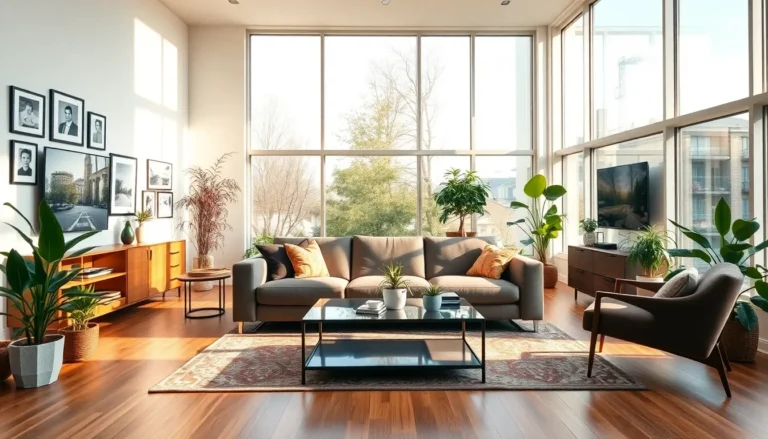Table of Contents
ToggleChoosing between renting and buying a house can feel like trying to decide whether to adopt a cat or a dog. One’s fluffy, the other’s loyal: both bring joy but also their own unique set of challenges. In the realm of real estate, it’s not just about where you’ll be sleeping at night, but also how your decision will impact your finances and lifestyle. This comprehensive guide breaks down the key factors in making this life-altering decision, complete with the good, the bad, and the downright confusing aspects of both renting and buying. So grab your proverbial hard hat, because we’re diving deep into the world of home ownership.
Understanding Renting

When it comes to housing, renting is often seen as the more flexible option, appealing to those who crave the freedom to relocate without the hassle of selling a home. But what does this flexibility truly mean?
Advantages of Renting
- Flexibility: Renting allows individuals to move according to job changes or personal circumstances without the lengthy process of selling a house. This is particularly advantageous for students or young professionals who may relocate frequently.
- Lower Initial Costs: When renting, the initial costs are considerably lower compared to buying. Generally, you’ll only need a security deposit and the first month’s rent.
- Maintenance-Free Living: Most landlords take care of maintenance problems, from leaky faucets to broken heaters. Tenants can enjoy peace of mind, focusing on their careers or leisure activities.
- No Market Risk: Renters aren’t subject to the fluctuations of the housing market. They may find comfort knowing that their rent won’t fluctuate dramatically year over year, unless their lease says otherwise.
Disadvantages of Renting
- No Equity Accumulation: Renting means pouring money into someone else’s property without gaining any ownership. This can feel like throwing money away, especially as rental prices continue to rise.
- Limited Control: Renters often face restrictions, such as limits on pet ownership or customization. Want to paint the living room a vibrant teal? Good luck with that.
- Rent Increases: Although consistent, many landlords impose annual rent increases, which can strain finances over time.
- Instability: Renters are at the mercy of landlords. Lease terminations and evictions can create a sense of insecurity that many never quite shake off.
Understanding Buying
In contrast to renting, buying a home signifies a long-term commitment. It can be a rewarding journey, transforming a house into a personalized sanctuary. But the process comes with its own set of challenges.
Advantages of Buying
- Equity Growth: Owning a home means building equity over time as property values rise. This can contribute to long-term financial stability and serve as an investment.
- Customization: Homeowners can create a living space that reflects their personality, from whimsical wallpaper to that grandiose home theater. The choices are theirs to make without needing a landlord’s approval.
- Stability: Knowing that mortgage payments stay largely the same over the years offers peace of mind. Homeownership is less affected by the occasional whims of the rental market.
- Tax Benefits: In some cases, homeowners can reap tax benefits, such as deductions on mortgage interest and property taxes, adding to the financial allure of owning a home.
Disadvantages of Buying
- High Upfront Costs: Entering the world of homeownership requires a significant initial investment. This includes the down payment, closing costs, and other expenses that can be a hefty barrier.
- Ongoing Maintenance: Homeowners bear the full responsibility of maintenance. This means budgeting for new roof shingles or landscaping, which can lead to unexpected costs.
- Market Vulnerability: The housing market can be unpredictable. Home values can drop, leaving owners with properties worth less than they bought for.
- Less Flexibility: Owning a home ties individuals to one location, making moving for work or other opportunities more complicated.
Financial Considerations
When weighing renting versus buying, finance plays a crucial role in shaping the decision. The financial implications stretch far beyond just monthly payments.
- Overall Costs: Calculate the total costs over time, including mortgage payments, property taxes, maintenance, and insurance for homeowners versus monthly rent and renters’ insurance for tenants.
- Investment Potential: It’s wise to consider how much return on investment is possible through homeownership. Historically, real estate tends to appreciate over several years, but it’s essential to analyze local market conditions.
- Credit Implications: Mortgage approval often requires a good to excellent credit score, which may not be an issue when renting. This factor can eliminate great housing options for those with less favorable credit histories.
- Budgeting and Savings: Renting may free up some cash for savings, while homeownership often requires a tighter budget. Understanding these nuances can help individuals establish their financial goals.
Market Conditions and Timing
Market conditions play a pivotal role in deciding whether to rent or buy at any given time. The choice isn’t solely personal: it’s intricately tied to external factors, including economic trends.
- Current Market Trends: Understanding whether it’s a buyer’s or seller’s market can influence the decision. In a seller’s market, higher home prices may deter potential buyers, making renting a more viable option.
- Interest Rates: When interest rates are low, borrowing to buy a home becomes more affordable. Conversely, high rates can squeeze budgets and may encourage renting instead.
- Local Economy: The health of the local economy influences job security and income levels, impacting whether individuals feel confident buying or prefer the flexibility of renting.
- Time of Year: Seasonal patterns pepper the housing market cycles. Typically, spring and summer see more homes listed for sale, while winter often presents fewer options, impacting both buyers and renters.
Making the Right Choice for You
Deciding between renting and buying depends heavily on individual circumstances. What works for one person may not suit another. Here’s how to navigate this important decision:
- Lifestyle Considerations: Determine personal goals, career stability, and family size, as these will heavily influence housing decisions.
- Future Plans: Consider how long you plan to stay in one place. If you expect to relocate soon, renting could be more practical.
- Financial Readiness: Assess current financial standing, including savings and monthly income. It’s vital to ensure that your housing choice won’t overextend your budget.
- Long-Term Vision: Contemplate your long-term aspirations and how owning or renting aligns with those goals. If settling down and building equity is the goal, buying may be the ideal route.







